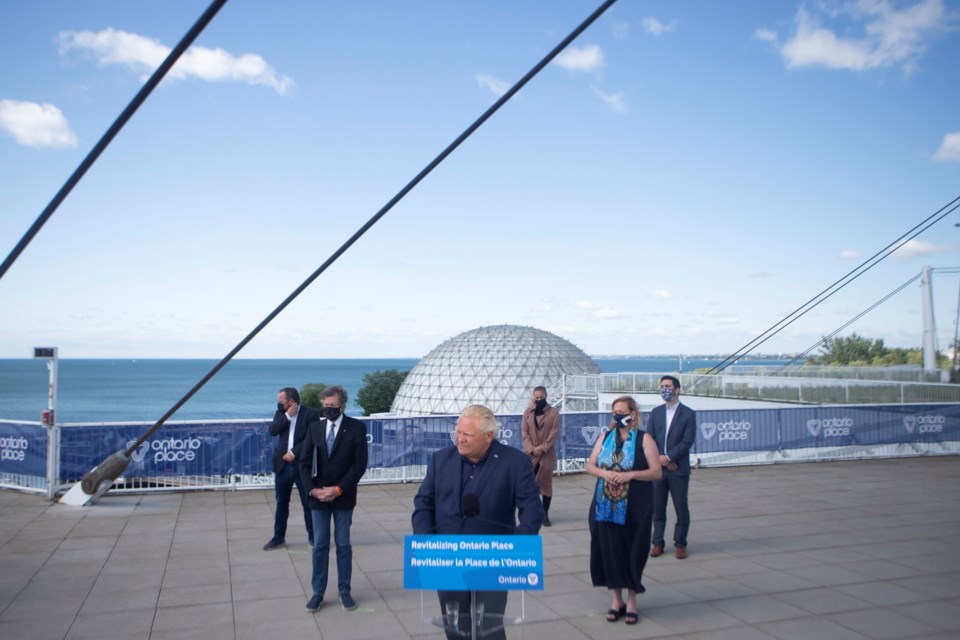The legal viability of the Ford government's Ontario Place redevelopment plans will be tested early in 2024.
At least one court challenge of the plans, which include the controversial private spa and waterpark that Therme intends to build, is set to see its first action involving a judge on Jan. 9.
There hasn't been a decision made yet on when — or whether — another legal challenge that could also impact the larger redevelopment will take place. The outlook for this second separate court challenge could also be shaped early in the new year.
An injunction attempt launched by Ontario Place For All will first be weighed in on by a judge in January. The activist group opposes Therme's plan to build a private spa and waterpark on the West Island of the man-made Toronto waterfront site, instead advocating that more of the land be publicly accessible.
In late November, Ontario Place For All asked a provincial court to order that tree-clearing and other preliminary redevelopment work on the West Island be halted until the provincial government completes an environmental assessment of its impact.
Site preparation and Therme's planned spa and waterpark were exempted from an environmental assessment that the provincial government completed earlier this year.
The Impact Assessment Agency of Canada, a federal agency that carries out similar kinds of assessments and reports to Environment Minister Steven Guilbeault, determined that Therme's planned facility “is likely to cause" adverse effects to wildlife and natural habitats at Ontario Place, but that they can be mitigated by the company.
The federal agency ultimately declined to suggest to Guilbeault that it carry out a full assessment of its own, which Ontario Place For All had asked for in mid-September. The federal government revealed that Guilbeault was following the agency's recommendation in early December.
Ontario Place For All also asked the court to order Therme and the provincial government to release their lease agreement, which grants the company tenancy of the West Island land for up to 95 years, as Global News first reported. Some other terms of the lease — like a requirement for the provincial government to provide "a number of dedicated parking spaces to Therme" — were revealed in a recent report by Ontario's auditor general.
The full lease has, however, been kept under wraps. The Trillium's attempt to obtain it through Ontario's freedom-of-information system was rejected, with Infrastructure Ontario citing several legal exemptions in its decisions that include those meant to protect third-party information and the province's economic interests.
A judge will meet with representatives of Ontario Place For All and the provincial government on Jan. 9 to discuss the activist group's requests of the court and potential next steps.
In a separate request, a lawyer representing a group styling itself as Ontario Place Protectors applied on Dec. 8 for a judicial review of Bill 154, the New Deal for Toronto Act.
A majority of Progressive Conservative MPPs voted to pass the legislation on Dec. 5, the day before the provincial parliament rose for its two-and-a-half winter break from sitting. NDP, Liberal and Green MPPs voted against it. The next day, Dec. 6, Bill 154 received Royal Assent and was mostly put into force.
Bill 154 allows the provincial government to make good on its titular promise, which Premier Doug Ford and Toronto Mayor Olivia Chow announced the morning of the legislation's tabling. It essentially gives the provincial government autonomy over Ontario Place, most of which it already owns.
“It is called Ontario Place,” Chow said on Nov. 27. “The land belongs to the provincial government and we do not have the authority to stop the development. The future of Ontario Place, the debate is going to happen here at Queen’s Park and not at the municipal level.”
Chow had promised during her mayoral election campaign to fight the Ford government's Ontario Place redevelopment plans, but abandoned that pledge in exchange for the province taking responsibility for two highways plus and committing new funding to the municipality.
As part of Chow's and Ford's deal, the provincial government also agreed to move new parking that it's adding to the area to Exhibition Place, the mainland area that Ontario Place connects to.
Bill 154 exempts Ontario Place from provincial environmental assessment requirements and gives Infrastructure Minister Kinga Surma special authority over the redevelopment project, including the power to issue minister's zoning orders that could speed up construction.
The Ontario Place Protectors application seeks to have Bill 154 declared as having no effect, arguing that the legislation "does not comport with the rules of natural justice and procedural fairness... (and) the rule of law" and that it "breaches the principles of public trust." No judge has ruled on the application yet, and no hearings nor meetings have been scheduled about it.
"Taking such extraordinary powers for the particularly frivolous purpose of clearing the way for an unwanted and unnecessary spa/waterpark owned by a foreign, for-profit corporation with a still secret 95-year lease on public lands simply cannot go unchallenged," Eric Gillespie, a lawyer representing Ontario Place Protectors, said in a Dec. 8 news release about its court application.
Heading into 2024, Ford's PCs have been able to celebrate a string of wins for its Ontario Place redevelopment plans, which the provincial NDP, Liberals and Greens all oppose.
Ford's and Chow's agreement, Bill 154's passage, and Guilbeault's decision each cleared potential roadblocks to the overall project.
Another suspected test of the project that it's expected to confront next year will come from the auditor general's office. The provincial oversight office has been working on a special audit of the redevelopment plans since a few months ago.
—With files from Aidan Chamandy and Jessica Smith Cross




.png;w=120;h=80;mode=crop)